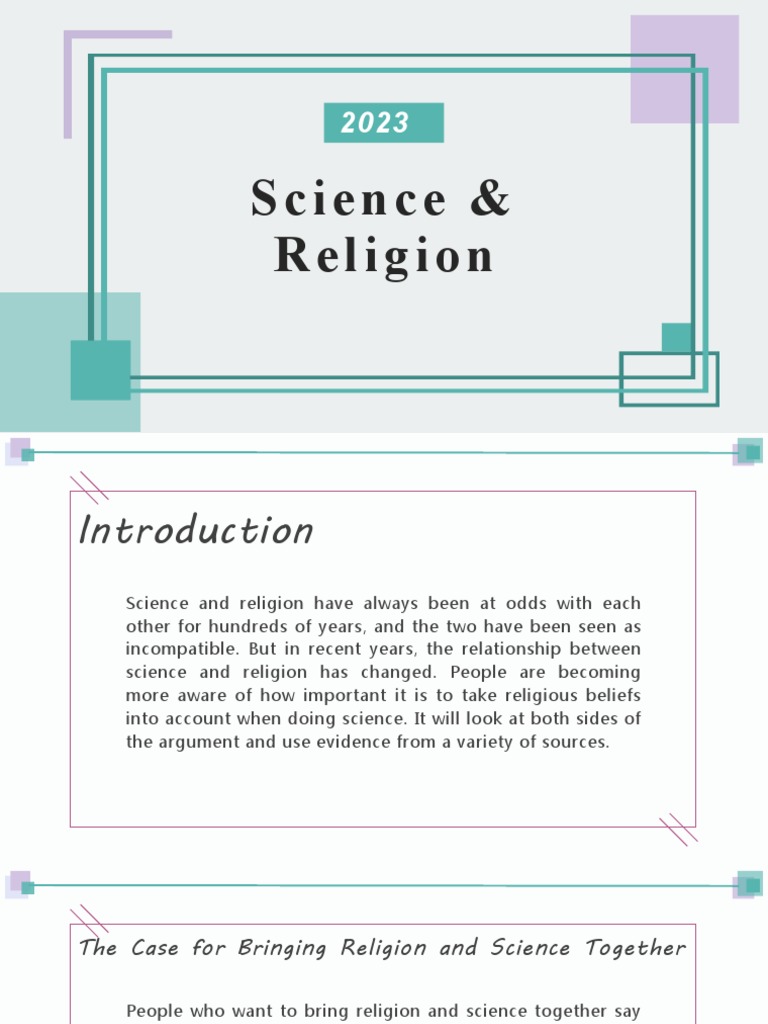In contemporary discourse, the intersection of religion, science, and reason often spurs profound interest and debate. Many consider this triad to be not only integral to human knowledge and understanding but also reflective of deeper philosophical principles that govern existence and human purpose. Within the framework of Bahá’í teachings, this dynamic relationship is articulated with a degree of nuance that fosters both inquiry and synthesis. The Bahá’í Faith posits that religion and science, when harmonized, cultivate a holistic grasp of reality, thereby underscoring the necessity of reason.
At the onset, it is essential to delineate how the Bahá’í perspective embraces both religion and science as dual avenues of knowledge acquisition. Bahá’u’lláh, the founder of the Bahá’í Faith, proclaimed that the two domains are complementary rather than antithetical. In fact, he emphasized that true science and true religion ought to lead individuals towards the same truth. This assertion compels a reevaluation of the polarized views commonly adopted in contemporary society where science and spiritual beliefs frequently appear at odds.
Equally pertinent is the recognition that both realms originate from the same divine source; the recognition of which fosters an understanding that scientific advancement is intended to uplift humanity spiritually. This principle can be epitomized by the Bahá’í tenet that “the well-being of mankind, its peace and security, are unattainable, unless and until its unity is firmly established.” Envisioning humanity’s spiritual evolution as reliant on the progressive unveiling of truth emphasizes the imperative of uniting our intellectual and spiritual endeavors. As humanity advances, both its scientific and ethical frameworks must evolve in tandem, ultimately reflecting a greater harmony.
Moreover, the Bahá’í teachings underscore the pivotal role of reason as a guiding principle in the exploration of both science and religion. It is reason that ultimately leads individuals away from blind faith and dogmatism, ushering them towards a more profound comprehension of their existence and the universe at large. Bahá’í discourse implores individuals to engage with the principles of reason critically—a mode of engagement that effectively bolsters understanding. This interplay of reason with spiritual insight establishes a dual pathway towards knowledge, signaling to adherents that both objective analysis and subjective experience contribute significantly to one’s understanding of complex existential questions.
A prevailing observation within the Bahá’í framework is that the genuine pursuit of knowledge—whether it be through scientific inquiry or spiritual reflection—should not yield discord. This standpoint prompts exploration into the historical antagonism often witnessed between religion and science. A common viewpoint reconciles these tensions through an acknowledgment that many of the apparent conflicts arise from misinterpretations or the contextual limitations of both scientific theories and religious dogmas. In this light, the Bahá’í perspective seeks not to obliterate distinctions between various belief systems but instead to cultivate a dialogue enriched by the contributions of diverse human experiences.
Furthermore, Bahá’í teachings advocate for a progressive understanding of religious truth—one that evolves and adjusts in light of new scientific discoveries. The evolving nature of truth is particularly salient in an age where scientific paradigms shift with empirical findings. The emphasis on adaptive interpretations of spiritual principles resonates with contemporary examples in which established scientific theories have undergone significant reevaluation over time. Thus, by maintaining a flexible approach to spiritual truths, Bahá’ism endorses a symbiotic relationship with an ever-evolving scientific landscape, reinforcing the compatibilities between faith and reason.
In addition to harmonization, the Bahá’í framework posits that both science and religion serve humanity’s overarching goal: the betterment of society. Each discipline instills moral imperatives that guide ethical behavior and catalyze social progress. For instance, scientific advancement necessitates ethical considerations—particularly in fields such as biotechnology and artificial intelligence. The principles espoused by the Bahá’í Faith thus promote a conscientious approach to scientific innovation, integrating moral considerations into discussions about the implications of scientific developments. This is pivotal in ensuring that human welfare remains the focal point of all initiatives, corroborating the notion that neither science nor religion exists in a vacuum but rather as interdependent forces for good.
When observing the empirical basis of science alongside the moral underpinnings of religion, one cannot overlook the expansive implications this relationship holds for education and the intellectual development of future generations. The Bahá’í teachings advocate for a comprehensive educational framework that incorporates both spiritual and scientific knowledge. Such an integrative approach not only elevates the intellectual capacity of individuals but also fosters a sense of responsibility towards the well-being of the world. Through education that emphasizes interconnectedness, students are equipped with the tools necessary to navigate complex ethical dilemmas while embracing a holistic perspective of reality.
In conclusion, the dynamic relationships between religion, science, and reason within Bahá’í teachings reflect a call to transcend polarities and embrace a synthesis of understanding. By advocating for the complementary nature of these domains, Bahá’í principles encourage individuals to explore the depths of knowledge with an open heart and a discerning mind. It is an invitation for humanity to navigate its intricate existence with wisdom, aligning its scientific advancements with its spiritual aspirations, thereby forging a path toward unity and enlightenment. In doing so, a more harmonious world emerges, one in which reason and faith coexist and collaboration lead to enriched human experience.
